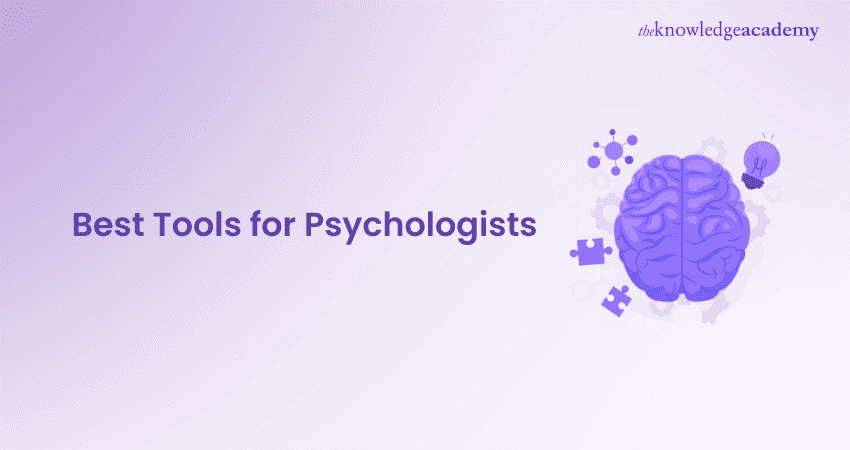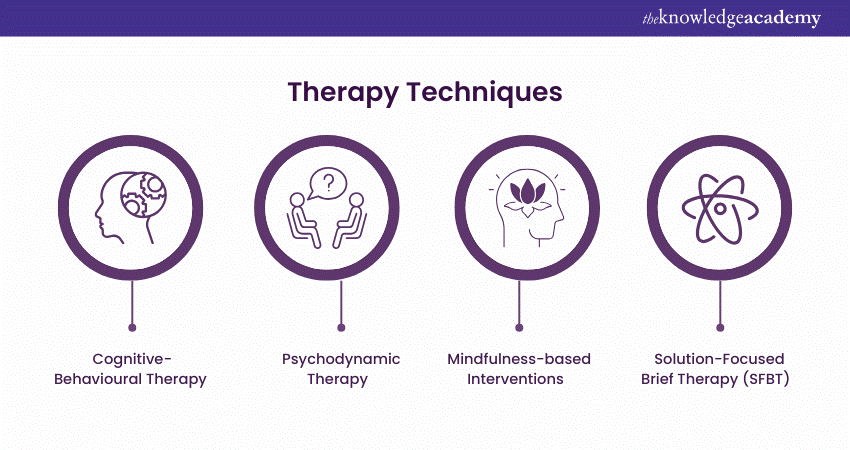We may not have the course you’re looking for. If you enquire or give us a call on +48 221041849 and speak to our training experts, we may still be able to help with your training requirements.
We ensure quality, budget-alignment, and timely delivery by our expert instructors.

Psychological Tools are instruments, resources, and techniques used by Psychologists to understand, assess, and intervene in various aspects of human behaviour and mental processes. Psychological Tools are evaluations of specialised methods that progress the discipline and improve Psychologists' capacity to help people's psychological wellbeing. They enable professionals to gather data, diagnose conditions, design effective treatment plans, and conduct research studies.
Psychological Tools include assessments of specialised techniques that contribute to the field's advancement and enhance Psychologists' ability to support individuals' Psychological well-being. This blog explains some of the best Psychological Tools utilised in the industry, shedding light on their significance and impact.
Table of Contents
1) What is Psychology?
2) What are Some Psychology Concepts?
3) What are Some Commonly Used Psychological Assessment Tools?
4) Therapy Techniques
5) Conclusion
What is Psychology?
Psychology can be defined as the branch of science which studies the human mind and behaviour. This field of science covers various topics and approaches for neural Psychological behaviour, cognitive processes, emotional social interactions and development. It has also many sub-disciplines, such as Clinical Psychology, Counselling Psychology, Cognitive Psychology and Social Psychology.
What are some Psychology Concepts?
There are several concepts which Psychologists and researchers use to understand human behaviour, emotions, and cognition. Here are some of these psychological concepts:
a) Cognitive Dissonance: This concept of Psychology explains the discomfort that a person faces when they are holding different concepts and beliefs which are conflicting with each other.
b) Social Cognitive Theory: This theory states that that people need to imitate the behaviours, attitudes and emotional reactions of each other.
c) Classical Conditioning: This concept explains that a neutral stimulus can become a meaningful stimulus to generate a similar response.
d) Operant Conditioning: People can learn new things by being rewarded or punished for their behaviour. This concept is called operant conditioning.
e) Nature vs Nurture: This concept has stirred a bit of conflict because it discusses that a person’s qualities or nature that they have been born with and the experiences that they have earned throughout their life make an impact both on their physical and behavioural traits.
What are some commonly used Psychological assessment tools?
Assessment tools in Psychology refer to the standard tests, surveys and information-gathering mechanics that allow a Psychologist to understand people and their problems in greater detail. It is a systematic procedure that allows people to convey their mental state to psychological experts.
Psychological assessments
Psychological assessments play a crucial role in clinical practice and research by providing valuable insights into individuals' psychological functioning. These assessments encompass a variety of tools, such as intelligence tests, personality inventories, and diagnostic assessments.
Intelligence tests, like the Wechsler Intelligence Scale for adults (WAIS) and children (WISC), measure cognitive abilities, while personality inventories, such as the Minnesota Multiphasic Personality Inventory (MMPI), assess personality traits and Psychopathology.
Diagnostic assessments, namely the Structured Clinical Interview for DSM Disorders, aid in diagnosing Mental Health conditions. These assessments enable Psychologists to gather comprehensive information, formulate accurate diagnoses, and develop effective treatment plans.
Neuropsychological Tests
Therapy techniques in Psychology refer to the specific approaches and methods used by therapists to help individuals address Psychological challenges, improve mental well-being, and promote personal growth. Various therapeutic modalities, such as Cognitive-behavioural therapy (CBT), psychodynamic therapy, humanistic therapy, and mindfulness-based interventions, inform these techniques.
Therapy techniques encompass a wide range of strategies and methods tailored to clients' unique needs. These techniques are tools that aim to facilitate insight, emotional healing, behaviour change, and the development of coping skills, ultimately supporting individuals in their journey towards Psychological health and well-being.
Begin your career in Psychology with our Psychology Course today!
Therapy Techniques
Therapy techniques in Psychology refer to the specific approaches and methods used by therapists to help individuals address Psychological challenges, improve mental well-being, and promote personal growth. These Techniques include:

Therapy techniques in Psychology refer to the specific approaches and methods used by therapists to help individuals address Psychological challenges, improve mental well-being, and promote personal growth. These techniques are informed by various therapeutic modalities, such as CBT , psychodynamic therapy, humanistic therapy, and mindfulness-based interventions.
Therapy techniques encompass a wide range of strategies and interventions tailored to the unique needs of clients. These techniques are tools that aim to facilitate insight, emotional healing, behaviour change, and the development of coping skills, ultimately supporting individuals in their journey towards psychological health and well-being.
Cognitive-Behavioural Therapy (CBT)
CBT is a commonly utilised approach for therapy. It places emphasis on the relationship between thoughts, emotions, and actions. It aims to identify and modify dysfunctional thinking patterns to alleviate various mental health disorders. Cognitive restructuring involves challenging and replacing negative thoughts with more adaptive and rational ones.
Exposure therapy exposes individuals to feared situations gradually, helping them overcome anxiety and phobias. CBT has demonstrated effectiveness in treating conditions such as anxiety disorders, severe depression and Post-Traumatic Stress Disorder (PTSD), offering individuals practical strategies to manage their thoughts, emotions, and behaviours.
Psychodynamic Therapy
Psychodynamic therapy is rooted in Freudian principles and focuses on uncovering unconscious conflicts and unresolved childhood experiences that may influence current behaviour and emotions. Techniques like free association encourage clients to express thoughts and feelings without censorship, facilitating the exploration of hidden emotions and patterns.
Dream analysis aims to interpret symbolic meanings in dreams to gain insight into unconscious processes. Psychodynamic therapy helps individuals gain self-awareness, understand the influence of the past on the present, and develop healthier ways of coping with challenges.
Mindfulness-based Interventions
Mindfulness-based interventions draw from ancient contemplative practices and emphasise being present at the moment without judgment. Mindfulness meditation involves directing attention to the present experience, encouraging self-awareness and acceptance. Acceptance and Commitment Therapy (ACT) can encourage people to accept uncomfortable thoughts and feelings while committing to behaviours aligned with personal values.
Mindfulness-based interventions have shown effectiveness in reducing stress, anxiety, and depression, improving well-being, and cultivating resilience. These practices promote Psychological flexibility and empower individuals to respond more effectively to life's challenges with greater clarity and compassion.
Solution-Focused Brief Therapy (SFBT)
SFBT is a goal-oriented approach that focuses on identifying and building solutions rather than dwelling on problems. Therapists help individuals explore their desired future outcomes and develop small, achievable steps towards their goals. SFBT emphasises strengths, resources, and exceptions to the problem.
Highlighting and amplifying what is already working in clients' lives allows SFBT to encourage individuals to tap into their own capabilities for change. This approach is particularly effective in brief therapy settings and can be beneficial for a wide range of issues, including relationship problems, addiction, and personal development.
Struggling with Anxiety? Find guidance with our Handle Anxiety Masterclass today!
Experimental Design
Experimental design is a rigorous research methodology employed to investigate cause-and-effect relationships in Psychology. It involves manipulating independent variables to observe their impact on dependent variables while controlling for extraneous factors.
Key concepts of experimental design include independent and dependent variables, randomisation to minimise bias, and the use of control groups to establish baseline comparisons. By utilising experimental design, Psychologists can get meaningful results about the effects of specific factors on human behaviour and cognition, providing valuable insights into Psychological processes and informing evidence-based interventions.
Survey Research
Survey research is a commonly used method in psychological research to gather information about the attitudes, beliefs, and behaviours of individuals or groups. Surveys involve the administration of structured questionnaires to a sample of participants. Researchers carefully construct survey questions to elicit reliable and valid responses.
Sampling methods, such as random sampling or convenience sampling, are employed to ensure the representativeness of the target population. Data analysis techniques, including descriptive and inferential statistics, are used to interpret survey data and draw conclusions. Survey research provides valuable insights into psychological phenomena, allowing researchers to explore relationships, trends, and patterns within a given population.
Conclusion
In conclusion, this blog has provided a glimpse into some of the Best Tools for Psychologists. From assessments that aid in understanding Psychological conditions to therapeutic techniques that facilitate growth and research methodologies that advance the field, these tools are invaluable in psychological practice and research.
Learn to encourage mental wellbeing with our Mental Health and Wellbeing Training!
Frequently Asked Questions
What is the Most Used Psychological Therapy?

Cognitive Behavioral Therapy (CBT) is the most widely used psychological therapy known for its effectiveness in treating anxiety, depression, and stress. Its evidence-based, goal-oriented approach helps individuals reframe negative thoughts and develop healthier behaviours.
What is the Purpose of Psychological Tools?

Psychological Tools are designed to assess, understand, and address mental health and behavioural patterns. They help professionals evaluate cognitive abilities, emotional states, and personality traits, providing insights that guide effective interventions and promote mental well-being.
What are the Other Resources and Offers Provided by The Knowledge Academy?

The Knowledge Academy takes global learning to new heights, offering over 3,000 online courses across 490+ locations in 190+ countries. This expansive reach ensures accessibility and convenience for learners worldwide.
Alongside our diverse Online Course Catalogue, encompassing 19 major categories, we go the extra mile by providing a plethora of free educational Online Resources like News updates, Blogs, videos, webinars, and interview questions. Tailoring learning experiences further, professionals can maximise value with customisable Course Bundles of TKA.
What is The Knowledge Pass, and How Does it Work?

The Knowledge Academy’s Knowledge Pass, a prepaid voucher, adds another layer of flexibility, allowing course bookings over a 12-month period. Join us on a journey where education knows no bounds.
What are Related Courses and Blogs Provided by The Knowledge Academy?

The Knowledge Academy offers various Mental Health Courses, including the Mental Health and Wellbeing Training, Handle Violence and Aggression at Workplace Course and Mental Capacity Training. These courses cater to different skill levels, providing comprehensive insights into Difference Between Voluntary and Involuntary Muscles.
Our Health & Safety Blogs cover a range of topics related to Mental Health, offering valuable resources, best practices, and industry insights. Whether you are a beginner or looking to advance your Health and safety Skills, The Knowledge Academy's diverse courses and informative blogs have got you covered.
Upcoming Health & Safety Resources Batches & Dates
Date
 Positive Psychology Course
Positive Psychology Course
Fri 14th Feb 2025
Fri 11th Apr 2025
Fri 13th Jun 2025
Fri 15th Aug 2025
Fri 10th Oct 2025
Fri 12th Dec 2025






 Top Rated Course
Top Rated Course



 If you wish to make any changes to your course, please
If you wish to make any changes to your course, please


